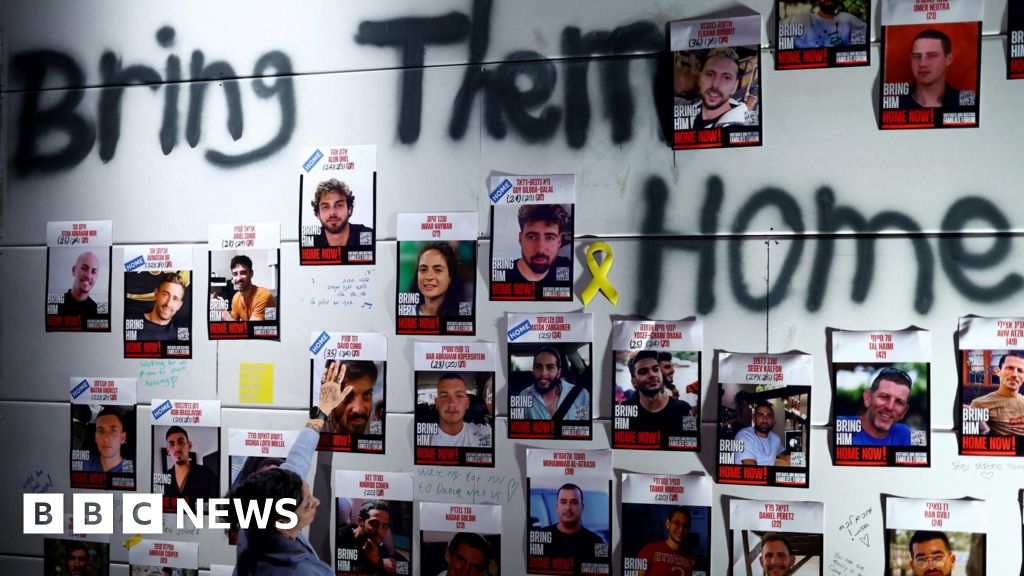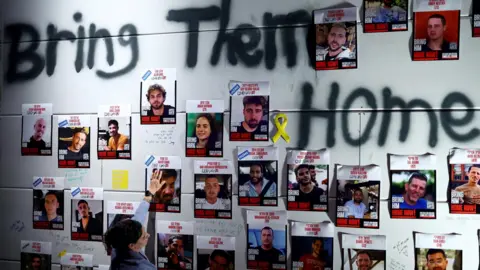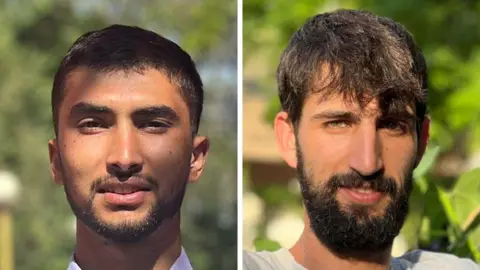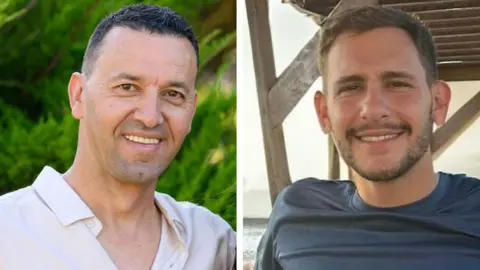
Israel identifies bodies of first four dead hostages returned by Hamas
David Gritten and
Rushdi AbualoufGaza correspondent, Istanbul
 Reuters
ReutersIsrael has identified the bodies of four deceased hostages which were returned by Hamas on Monday as part of the Gaza ceasefire agreement.
On Tuesday morning, the Israeli military named two of the hostages as Guy Illouz, a 26-year-old Israeli, and Bipin Joshi, a Nepalese citizen who was 23.
Later, the two other hostages were named by their families as Yossi Sharabi, a 53-year-old Israeli, and Daniel Peretz, 22, Israeli-South African dual national.
Meanwhile, Israeli officials said the government would restrict the entry of aid into Gaza and delay the reopening of the Rafah border crossing with Egypt over Hamas’s failure to hand over the bodies of the 24 other dead hostages on Monday.
Israel’s defence minister has said that “any delay or deliberate avoidance will be considered a gross violation of the agreement and will be responded to accordingly”.
Hamas has said it could take time because not all the hostages’ burial sites are known.
The 20 remaining living hostages were released by the Palestinian armed group on Monday in exchange for almost 2,000 Palestinian prisoners and detainees in Israeli jails.
The Israel Defense Forces (IDF) said on Tuesday morning that, following forensic testing, representatives had informed the families of Guy Illouz, Bipin Joshi and two other hostages that they had been brought back to Israel for burial.
The IDF said Illouz, a sound technician in the Israeli music industry from the central town of Ra’anana, was “injured and abducted alive” by Hamas gunmen after he escaped the attack on the Nova musical festival on 7 October 2023.
“Guy died from his wounds after not receiving proper medical treatment while held captive by Hamas,” it added.
The Hostages and Missing Families Forum in Israel cited released hostage Maya Regev as saying that Illouz was “kidnapped unconscious and lay alone for a whole week, tied to his bed.”
“A day and a half before his death, she was brought into his room at the hospital, where he told her that his mother was the strongest woman in the world, and that the moment he returned home he would hug her and never let go.”
Bipin Joshi was an agriculture student who had only been in Israel for a few weeks when Kibbutz Alumim was attacked by Hamas gunmen two years ago.
According to the Hostages Families Forum, he “fled to a shelter in the kibbutz with other foreign students, deflected a live grenade with his bare hands, and through his bravery saved many lives”.
The IDF said it had assessed that Joshi was “murdered in captivity during the first months of the war”.
 Hostages and Missing Families Forum
Hostages and Missing Families ForumOn Tuesday evening, the Hostages Families Forum said in a statement that it embraced the families of Daniel Peretz and Yossi Sharabi following their “return… to Israel yesterday for a proper burial”.
Yossi Sharabi was kidnapped from his home in Kibbutz Be’eri on 7 October along with his brother, Eli, whose British-Israeli wife and two daughters were killed.
Last year, the IDF said an investigation had found that Yossi was likely to have been killed when a building collapsed following an Israeli strike on another building nearby.
Eli was released by Hamas in February 2025 during the last ceasefire deal.
Daniel Peretz, who emigrated from South Africa to Israel when he was 13 and lived in the central town of Yad Binyamin, was a captain in the IDF’s 7th Armoured Brigade.
He was killed in an attack on his tank near Nahal Oz on 7 October and his body was taken to Gaza as a hostage, the IDF said last year.
Final conclusions about the deaths of the men would be determined after forensic examinations had been competed, the Israeli military said.
The Hostages Families Forum said the return of their bodies “brings some measure of comfort to families who have lived with agonising uncertainty and doubt for over two years”.
“We will not rest until all 24 hostages are brought home,” it added.
The IDF expressed condolences to their families and pledged to continue to make every effort to return the remains of the hostages in line with the ceasefire agreement.
“Hamas is required to fulfil its part of the agreement and make the necessary efforts to return all the hostages to their families and to proper burial,” it warned.
Later, Israeli officials told Reuters news agency that Israeli authorities had decided to keep the Rafah border crossing between Gaza and Egypt closed and to reduce deliveries of humanitarian aid to the territory until all the bodies were returned.
The UN’s humanitarian chief, Tom Fletcher, told the BBC that Hamas had to “get the bodies home, as they promised”, but also that Israel had to keep crossings into Gaza open in order for “desperately needed” aid to be delivered.
 Hostages and Missing Families Forum
Hostages and Missing Families ForumHamas has not yet issued a statement explaining the delay, but a senior Palestinian source told the BBC on Tuesday that the group’s negotiators were meeting mediators in Egypt to try to resolve the issue.
According to Hamas officials, some of the hostages’ bodies remain trapped under the rubble of buildings destroyed by Israeli bombardment and demolitions, and the group has requested the entry of heavy machinery to help with the recovery efforts.
A copy of the ceasefire agreement published by Israeli media last week appeared to acknowledge that Hamas and other Palestinian groups might not be able to locate all the bodies before the deadline of 12:00 local time (09:00) on Monday.
It established a mechanism between the two sides through the mediators and the Red Cross, which would allow them to exchange information and intelligence on the locations of the remains of any deceased hostages not retrieved before the deadline.
The Red Cross warned on Tuesday that the search could take days or weeks.
“The search for human remains is obviously an even bigger challenge than having the people alive being released,” spokesman Christian Cardon told journalists in Geneva.
“I think there is clearly a risk that that will take much more time. What we are telling the parties is that that should be their top priority,” he added.
Separately, Nasser hospital in southern Gaza said it had received the remains of 45 dead Palestinians held by Israel on Tuesday.
There was no announcement from Israeli authorities, but the ceasefire deal said they would exchange the bodies of 15 Palestinians for every dead Israeli hostage.
Fears are growing among Palestinians that the delay over the return of hostages’ bodies could derail the ceasefire.
Tayseer Abed, a well-known writer who has chronicled the war from his tent in the southern city of Khan Younis, described it as “a dangerous test”.
If the delay continued and Israel refused to move to the next phase of Donald Trump’s Gaza peace plan, “the corpses issue could become the fuse that ignites a new round of conflict”, he warned.
Palestinians also expressed concern about the continued deadly violence in Gaza.
On Tuesday, medics and first responders said Israeli drone fire killed five Palestinians as they went to check houses in the eastern Gaza City neighbourhood of Shejaiya.
Another person was killed in an Israeli strike east of Khan Younis, they said.
The IDF said it fired on suspects who were “identified crossing the yellow line” – the withdrawal line inside Gaza that was agreed in the ceasefire agreement – and approached its troops in a manner that constituted a threat.
A Hamas spokesman accused the Israeli military of violating the ceasefire.
The Israeli military launched a campaign in Gaza in response to the Hamas-led attack on southern Israel on 7 October 2023, in which about 1,200 people were killed and 251 others were taken hostage.
At least 67,913 people have been killed by Israeli military operations in Gaza since then, according to the territory’s Hamas-run health ministry.
First Appeared on
Source link







